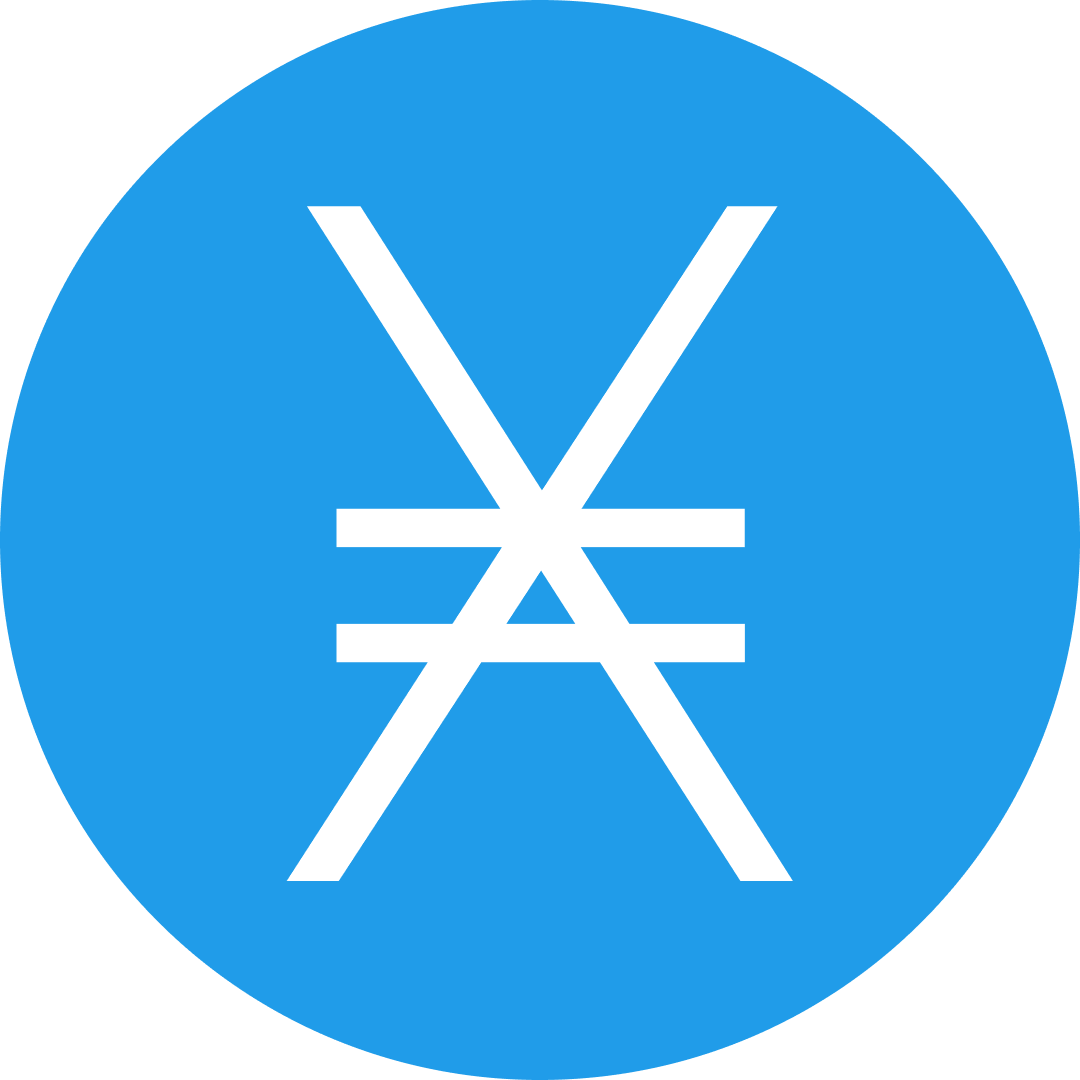-
 Bitcoin
Bitcoin $99,087.7373
0.54% -
 Ethereum
Ethereum $2,776.4132
-0.37% -
 XRP
XRP $2.5216
4.31% -
 Tether USDt
Tether USDt $1.0004
0.00% -
 Solana
Solana $201.2328
0.84% -
 BNB
BNB $586.8658
-0.01% -
 USDC
USDC $1.0000
0.00% -
 Dogecoin
Dogecoin $0.2594
-0.75% -
 Cardano
Cardano $0.7432
-0.52% -
 TRON
TRON $0.2317
0.90% -
 Chainlink
Chainlink $19.5652
0.00% -
 Avalanche
Avalanche $25.8306
-1.41% -
 Stellar
Stellar $0.3423
2.50% -
 Sui
Sui $3.3156
-3.10% -
 Toncoin
Toncoin $3.8288
-1.02% -
 Hedera
Hedera $0.2435
-0.30% -
 Shiba Inu
Shiba Inu $0.0...01553
-1.08% -
 UNUS SED LEO
UNUS SED LEO $9.8400
0.41% -
 Hyperliquid
Hyperliquid $24.6155
-0.59% -
 Litecoin
Litecoin $107.4174
1.13% -
 Bitget Token
Bitget Token $6.7070
-2.19% -
 Polkadot
Polkadot $4.8707
3.28% -
 Bitcoin Cash
Bitcoin Cash $331.2530
0.60% -
 MANTRA
MANTRA $6.3864
9.17% -
 Ethena USDe
Ethena USDe $1.0000
-0.02% -
 Uniswap
Uniswap $9.3795
1.16% -
 Dai
Dai $1.0000
0.00% -
 Ondo
Ondo $1.4723
6.16% -
 Monero
Monero $225.4238
-2.16% -
 Pepe
Pepe $0.0...09706
-2.10%
What ecology does RENDER belong to?
Within the blockchain ecosystem, RENDER's decentralized cloud computing network, focusing on high-performance GPU-based rendering, is a prime example of its unique contribution to the ecology.
Dec 13, 2024 at 10:13 pm
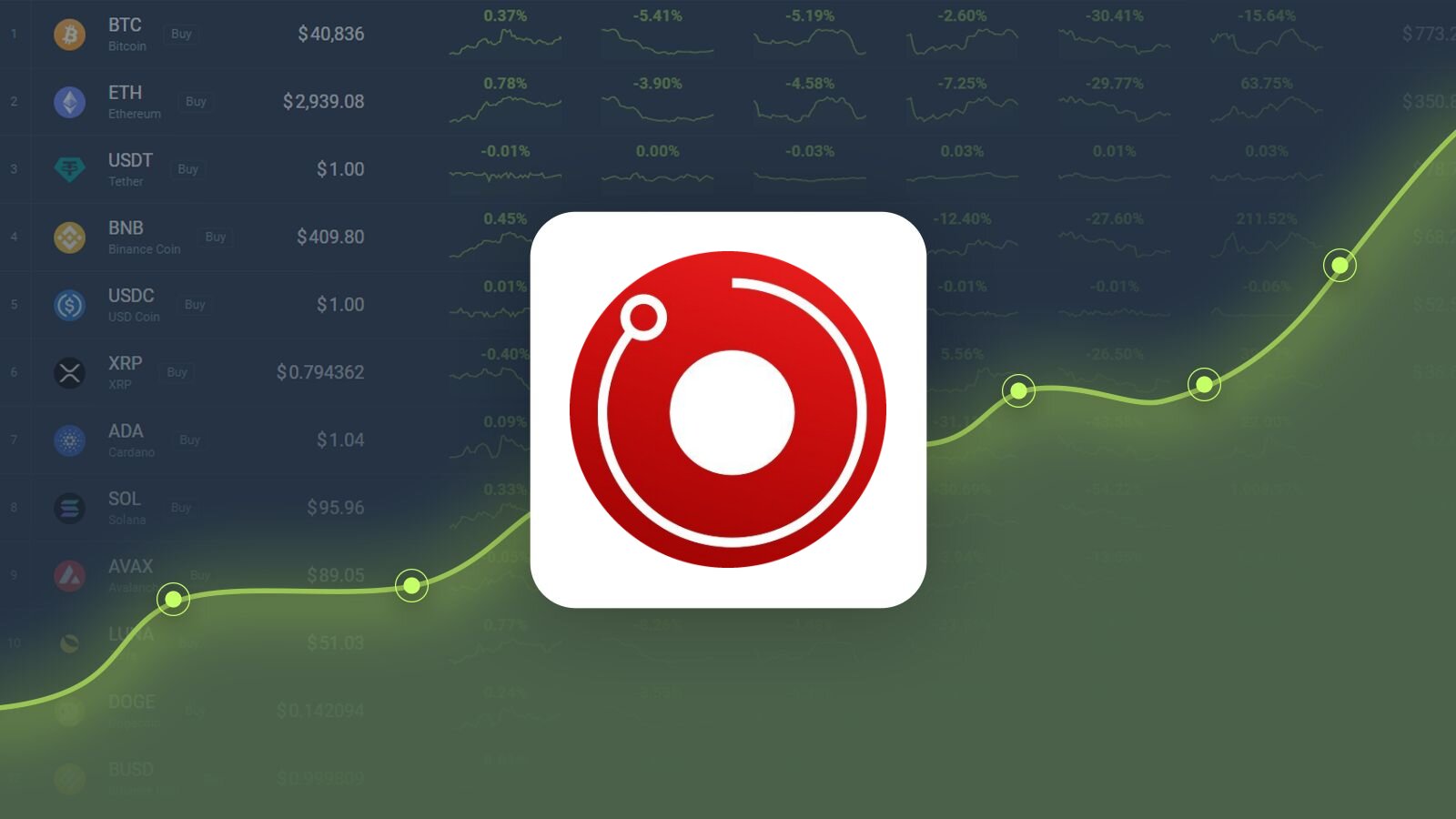
What Ecology Does RENDER Belong To?
RENDER is a decentralized, high-performance, infinitely scalable network that provides cost-effective cloud computing solutions for demanding 3D, AI, and VFX rendering applications. It harnesses the spare GPU computing power of computers across the globe to create a fully distributed GPU-based cloud rendering ecosystem. Within the realm of blockchain technology, RENDER falls under the category of decentralized cloud computing ecosystems.
Key Characteristics of Decentralized Cloud Computing Ecosystems:
- Distributed Computing: Unlike traditional centralized cloud computing providers, decentralized cloud computing platforms leverage a network of distributed computers to provide computing resources. In RENDER's case, these computers are primarily equipped with powerful GPUs suitable for rendering tasks.
- Peer-to-Peer Network: Decentralized cloud computing ecosystems operate on peer-to-peer (P2P) networks, enabling direct communication and resource sharing between participating nodes. In RENDER's network, users can act as both consumers and contributors of computing power.
- Blockchain Integration: Many decentralized cloud computing platforms, including RENDER, utilize blockchain technology to facilitate secure transactions, resource allocation, and governance. RENDER's RNDR token serves as a medium for payments and serves various roles within the ecosystem.
- Cost Efficiency: Decentralized cloud computing aims to reduce the high costs associated with traditional cloud services by utilizing spare computing resources from distributed nodes. RENDER offers competitive pricing and flexible pricing models, allowing users to optimize their rendering expenses.
- Flexibility and Scalability: Decentralized cloud computing platforms provide on-demand access to computing resources, enabling users to scale their rendering workloads up or down seamlessly. RENDER's vast network of distributed computers ensures high availability and flexibility for users.
- Security and Transparency: Blockchain-based decentralized cloud computing ecosystems prioritize security through decentralized data storage and transparent transaction records. RENDER employs advanced encryption and consensus mechanisms to safeguard user data and transactions.
RENDER's Unique Contribution to the Ecology:
- Focus on GPU-Based Rendering: RENDER is specifically tailored for demanding graphical rendering tasks, leveraging the power of GPUs for 3D, AI, and VFX rendering applications. Its network is optimized for high-performance rendering workloads.
- Global Network of Computing Nodes: RENDER boasts a globally distributed network of computers, ensuring wide availability of computing resources and reducing latency issues for users. Its decentralized architecture enables global collaboration and resource sharing.
- User-Friendly Interface and Marketplace: RENDER provides an intuitive user interface and an integrated marketplace that simplifies access to cloud rendering services for artists, studios, and developers. Users can easily find and connect with available computing nodes and manage their rendering tasks.
- Efficient Resource Allocation: RENDER's decentralized network facilitates efficient resource allocation through a trustless and transparent bidding system. Users can bid for computing resources based on their specific requirements and budget, ensuring optimal utilization of available resources.
- Community-Driven Governance: RENDER embraces community involvement through decentralized governance mechanisms. RNDR token holders participate in key decision-making processes, shaping the future direction and evolution of the platform. This fosters a sense of ownership and encourages active participation from the community.
- Innovative Use Cases: Beyond traditional rendering tasks, RENDER's platform supports a wide range of innovative use cases. These include decentralized video transcoding, AI-powered simulations, and the creation of immersive virtual worlds. Its versatility expands the boundaries of decentralized cloud computing applications.
Disclaimer:info@kdj.com
The information provided is not trading advice. kdj.com does not assume any responsibility for any investments made based on the information provided in this article. Cryptocurrencies are highly volatile and it is highly recommended that you invest with caution after thorough research!
If you believe that the content used on this website infringes your copyright, please contact us immediately (info@kdj.com) and we will delete it promptly.
- XRP Price Recent Dip Does Not Deter Experts from Forecasting Positive Growth Directions for the Cryptocurrency’s Future
- 2025-02-07 21:56:04
- Activate's Immersive Entertainment Experience Launches In Dallas-Fort Worth Area On February 12
- 2025-02-07 21:56:04
- Sony's Blockchain Project Soneium Launches Its First Music NFT Collection
- 2025-02-07 21:56:04
- Qubetics: Revolutionizing Online Privacy with Decentralized VPN
- 2025-02-07 21:56:04
- Mutuum Finance (MUTM): A Promising Investment Opportunity in the Decentralized Finance (DeFi) Space
- 2025-02-07 21:56:04
- Levels Protocol Revolutionizes Cryptocurrency Trading in the Solana Ecosystem with the Introduction of Dynamic Tokens
- 2025-02-07 21:56:04
Related knowledge
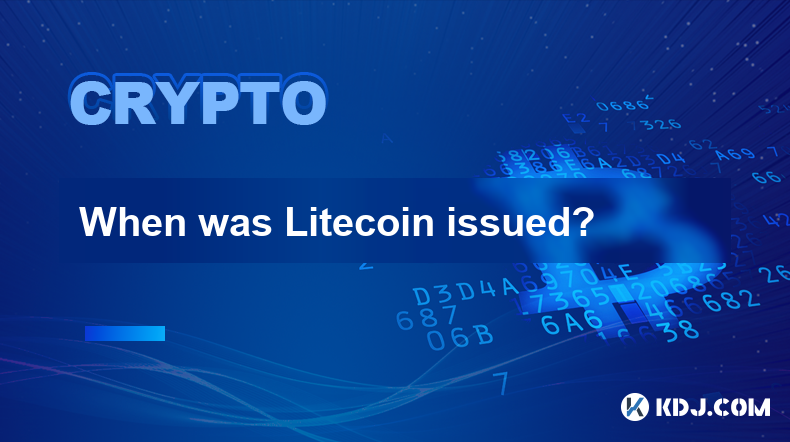
When was Litecoin issued?
Feb 04,2025 at 02:36am
When was Litecoin Issued?Key Points:Litecoin's inception and developmentLitecoin's launch date and market dynamicsLitecoin's technical specifications and key featuresLitecoin's Inception and DevelopmentLitecoin, conceived by former Google engineer Charlie Lee, emerged as a fork of Bitcoin in October 2011. Inspired by Bitcoin's revolutionary blockchain t...
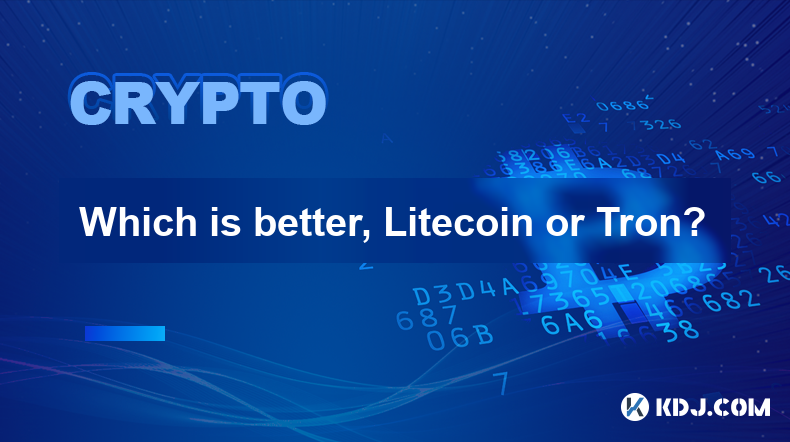
Which is better, Litecoin or Tron?
Feb 04,2025 at 10:30pm
Key Points:Similarities between Litecoin and Tron: Decentralized, open-source blockchain platformsDifferences between Litecoin and Tron: Use cases, consensus mechanisms, transaction speedsFactors to consider when choosing between Litecoin and Tron: Investment goals, risk tolerance, specific use casesPotential benefits and drawbacks of Litecoin and Tron:...
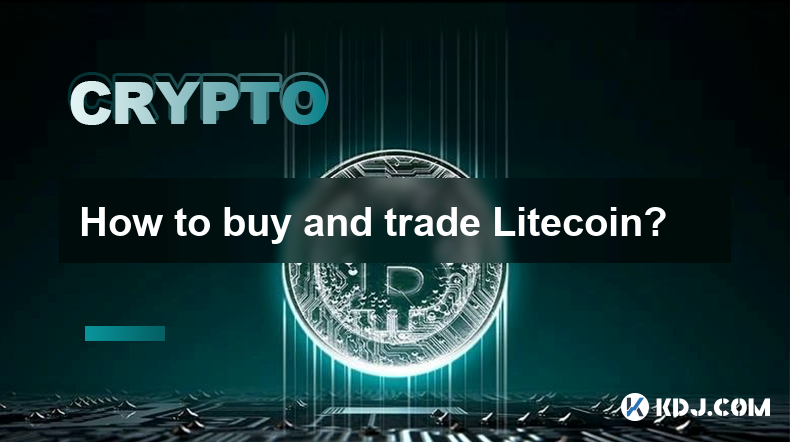
How to buy and trade Litecoin?
Feb 04,2025 at 12:24pm
Key Points:Understand the Basics of LitecoinSelect a Suitable Cryptocurrency ExchangeCreate an Account on the ExchangeFund Your AccountPlace a Buy Order for LitecoinSecurely Store Your LitecoinUnderstand Litecoin TradingHow to Buy Litecoin?1. Understand the Basics of LitecoinLitecoin (LTC) is a decentralized digital currency similar to Bitcoin.Created i...
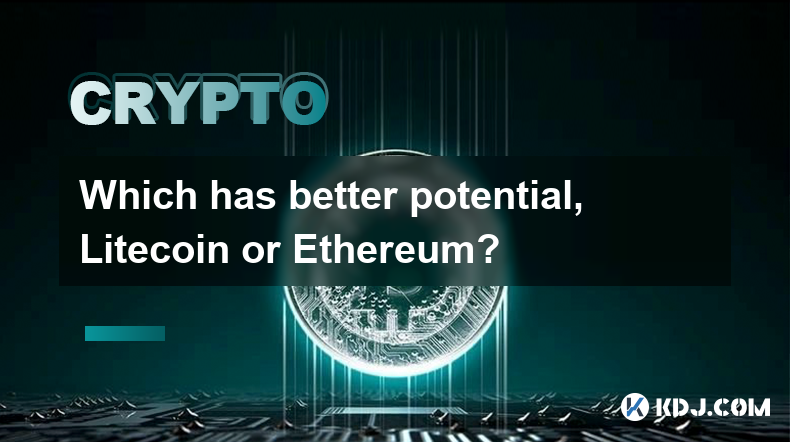
Which has better potential, Litecoin or Ethereum?
Feb 04,2025 at 05:30pm
Key Points:Litecoin and Ethereum are two of the most popular cryptocurrencies in the world.Both coins have their own unique advantages and disadvantages.Litecoin is a faster and cheaper transaction coin than Ethereum.Ethereum is a more versatile platform than Litecoin, and it can be used to create decentralized applications (dApps).Litecoin has a long h...
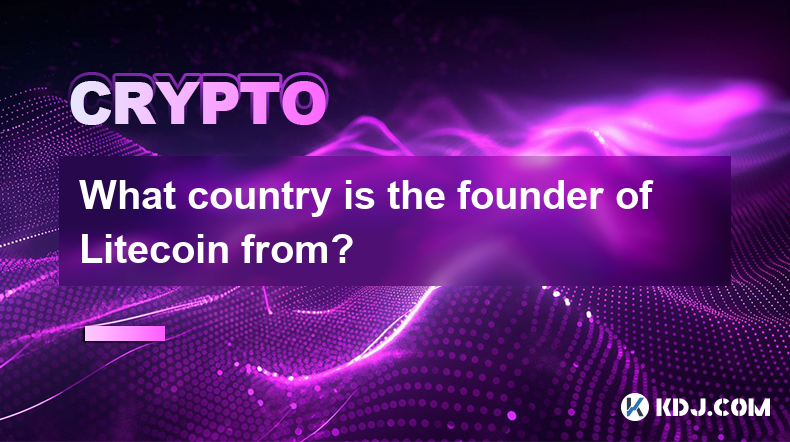
What country is the founder of Litecoin from?
Feb 04,2025 at 05:55am
Key Points:Litecoin's Founder and the Relationship with Charles LeeLitecoin's Technical Features and Similarities to BitcoinLitecoin's Role in the Cryptocurrency Ecosystem and Its PopularityComparative Analysis of Litecoin with Major CryptocurrenciesLitecoin's Community Involvement and PartnershipsArticle Content:Litecoin's Founder and the Relationship ...
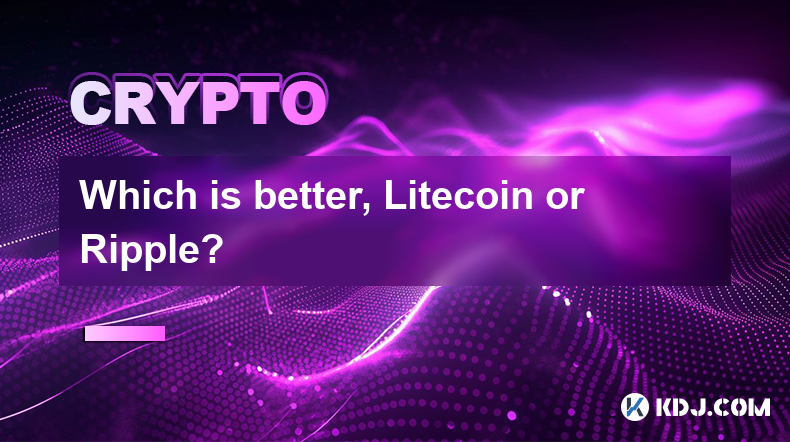
Which is better, Litecoin or Ripple?
Feb 04,2025 at 08:00pm
Key Points:Litecoin: a decentralized, peer-to-peer cryptocurrency based on the Proof-of-Work consensus mechanismRipple: a centralized, enterprise blockchain solution designed for fast and low-cost paymentsDirect comparison of Litecoin vs. Ripple in terms of technology, market capitalization, use cases, and transaction feesPotential benefits and drawback...

When was Litecoin issued?
Feb 04,2025 at 02:36am
When was Litecoin Issued?Key Points:Litecoin's inception and developmentLitecoin's launch date and market dynamicsLitecoin's technical specifications and key featuresLitecoin's Inception and DevelopmentLitecoin, conceived by former Google engineer Charlie Lee, emerged as a fork of Bitcoin in October 2011. Inspired by Bitcoin's revolutionary blockchain t...

Which is better, Litecoin or Tron?
Feb 04,2025 at 10:30pm
Key Points:Similarities between Litecoin and Tron: Decentralized, open-source blockchain platformsDifferences between Litecoin and Tron: Use cases, consensus mechanisms, transaction speedsFactors to consider when choosing between Litecoin and Tron: Investment goals, risk tolerance, specific use casesPotential benefits and drawbacks of Litecoin and Tron:...

How to buy and trade Litecoin?
Feb 04,2025 at 12:24pm
Key Points:Understand the Basics of LitecoinSelect a Suitable Cryptocurrency ExchangeCreate an Account on the ExchangeFund Your AccountPlace a Buy Order for LitecoinSecurely Store Your LitecoinUnderstand Litecoin TradingHow to Buy Litecoin?1. Understand the Basics of LitecoinLitecoin (LTC) is a decentralized digital currency similar to Bitcoin.Created i...

Which has better potential, Litecoin or Ethereum?
Feb 04,2025 at 05:30pm
Key Points:Litecoin and Ethereum are two of the most popular cryptocurrencies in the world.Both coins have their own unique advantages and disadvantages.Litecoin is a faster and cheaper transaction coin than Ethereum.Ethereum is a more versatile platform than Litecoin, and it can be used to create decentralized applications (dApps).Litecoin has a long h...

What country is the founder of Litecoin from?
Feb 04,2025 at 05:55am
Key Points:Litecoin's Founder and the Relationship with Charles LeeLitecoin's Technical Features and Similarities to BitcoinLitecoin's Role in the Cryptocurrency Ecosystem and Its PopularityComparative Analysis of Litecoin with Major CryptocurrenciesLitecoin's Community Involvement and PartnershipsArticle Content:Litecoin's Founder and the Relationship ...

Which is better, Litecoin or Ripple?
Feb 04,2025 at 08:00pm
Key Points:Litecoin: a decentralized, peer-to-peer cryptocurrency based on the Proof-of-Work consensus mechanismRipple: a centralized, enterprise blockchain solution designed for fast and low-cost paymentsDirect comparison of Litecoin vs. Ripple in terms of technology, market capitalization, use cases, and transaction feesPotential benefits and drawback...
See all articles



















